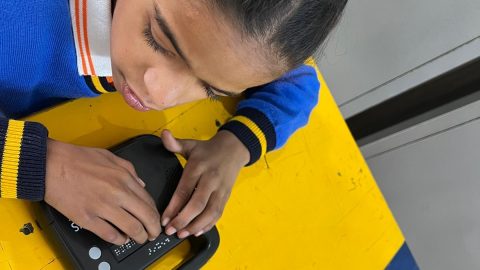CodeTalk: Rethinking accessibility for IDEs
By Suresh Parthasarathy, Senior Research Developer; Gopal Srinivasa, Senior Research Software Development Engineer
CodeTalk team members from left to right include: Priyan Vaithilingam, Suresh Parthasarathy, Venkatesh Potluri, Manohar Swaminathan and Gopal Srinivasa from Microsoft Research India.
Software programming productivity tools known as integrated development environments, or IDEs, are supposed to be a game changer for Venkatesh Potluri, a research fellow in Microsoft’s India research lab. Potluri is a computer scientist who regularly needs to write code efficiently and accurately for his research in human computer interaction and accessibility. Instead, IDEs are one more source of frustration for Potluri: he is blind and unable to see the features that make IDEs a boon to the productivity of sighted programmers, such as squiggly red lines that automatically appear beneath potential code errors.
Potluri uses a screen reader to hear the code that he types. He scrolls back and forth through the computer screen to maintain context. But using a screen reader with an IDE is incomplete since much of the information from these systems is conveyed visually. For example, code is syntax highlighted in bright colors, errors are automatically highlighted with squiggles and the debugger uses several windows to provide the full context of a running program. Performance analysis tools use charts and graphs to highlight bottlenecks and architecture analysis tools use graphical models to show code structure.
“IDEs provide a lot of relevant information while writing code; a lot of this information — such as the current state of the program being debugged, real-time error alerts and code refactoring suggestions, are not announced to screen reader users,” Potluri said. “As a developer using a screen reader, the augmentation IDEs provide is not of high value to me.”
Soon after Venkatesh joined Microsoft Research India in early 2017, he and his colleagues Priyan Vaithilingam and Saqib Shaikh launched Project CodeTalk to increase the value of IDE’s for the community of blind and low vision users. According to a recent survey posted on the developer community website Stack Overflow, users who self-identify as blind or low vision make up one percent of the programmer population, which is higher than the 0.4 percent of people in the general population. Team members realized that while a lot of work had gone into making IDEs more accessible, the efforts had fallen short of meeting the needs of blind and low vision developers.
As a first step, the team explored their personal experiences with IDE technologies. Potluri, for example, detailed frustrations such as trying to fix one last bug before the end of a long day, listening carefully to the screen reader and concentrating hard to retain in his mind the structures of the code file only to have the screen reader go silent a few seconds after program execution. Uncertain if the program completed successfully or terminated with an exception, he has to take extra steps to recheck the program that keep him at work late into the night.
The CodeTalk team also drew insights from a survey of blind and low vision developers that was led by senior researcher Manohar Swaminathan. The effort generated ideas for the development of an extension that improves the experience of the blind and low vision community of developers who use Microsoft’s Visual Studio, a popular IDE that supports multiple programming languages and is customizable. The CodeTalk extension and source code are now available on GitHub.
Highlights of the extension include the ability to quickly access code constructs and functions that lead to faster coding, learn the context of where the cursor is in the code, navigate through chunks of code with simple keystrokes and hear auditory cues when the code has errors and while debugging. The extension also introduces a novel concept of Talkpoints, which can be thought of as audio-based breakpoints.
Together, these features make debugging and syntax checking—two critical features of IDEs—far more accessible to blind and low vision developers, according to a study the CodeTalk team conducted with blind and low vision programmers. Real-time error information and talk points were particularly appreciated as significant productivity boosters. The team also began using the extension for their own development, and discovered that the features were useful for sighted users, as well.
CodeTalk is one step in a long journey of exploring ways to make IDEs more accessible. Research is ongoing to define and meet the needs of blind and low vision developers. The source code is available on GitHub and contributors are invited. The Visual Studio extension is available for download.
You can read more about this story on Microsoft’s Research Blog.
CodeTalk team members include Suresh Parthasarathy, Gopal Srinivasa, Priyan Vaithilingam, Manohar Swaminathan and Venkatesh Potluri from Microsoft Research India and Saqib Shaikh from Microsoft Research Cambridge.








